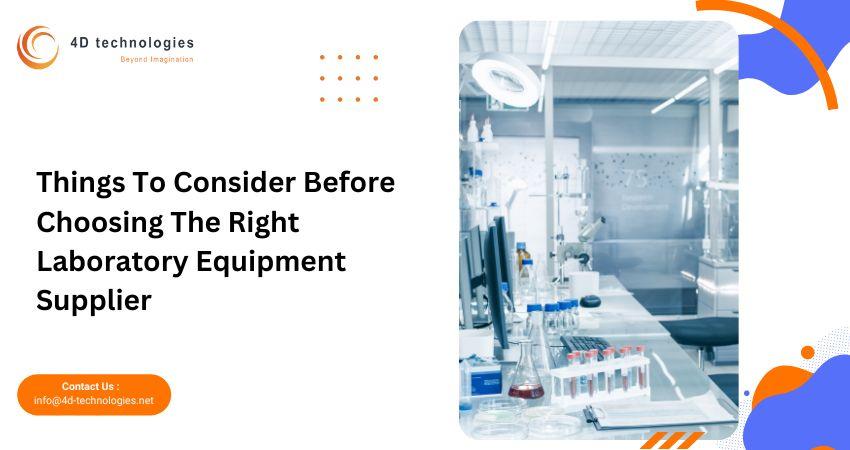
18 Jul Choosing the Right Laboratory Equipment Supplier: Guide
In the world of scientific research and experimentation, the quality and reliability of laboratory equipment play a pivotal role. Whether you are setting up a new laboratory or upgrading an existing one, choosing the right laboratory equipment supplier is a critical decision that can significantly impact the efficiency and success of your experiments. This article delves into the key considerations you should keep in mind when selecting a laboratory equipment supplier.
1. Understanding Your Specific Needs
Before embarking on your search for a laboratory equipment supplier, it’s crucial to have a clear understanding of your specific needs. Determine the type of experiments you’ll be conducting, the equipment required, and any unique features you might need to meet your research objectives.
2. Quality and Reliability of laboratory equipment supplier
Laboratory equipment is an investment, and it’s essential to choose suppliers that offer high-quality and reliable products. Look for suppliers who adhere to strict quality control measures and provide equipment that meets industry standards.
3. Product Range and Availability of lab
A reputable supplier like 4d-Technologies should offer a diverse range of laboratory equipment to cater to different research needs. Ensure that the supplier has the products you require readily available and can accommodate any future equipment needs.
4. Compliance with Standards and Certifications
Laboratory equipment must meet specific safety and regulatory standards. Choose a supplier who complies with these regulations and provides the necessary certifications for their products.
5. Customer Support and Service
Excellent customer support is paramount in the laboratory equipment purchasing process. A reliable supplier should offer prompt assistance, technical support, and quick resolutions to any issues that may arise.
6. Pricing and Cost-effectiveness
Budget considerations are significant in any laboratory setting. While it’s essential to find cost-effective options, remember that quality is equally crucial. Strike a balance between affordability and equipment performance.
7. Shipping and Delivery
Efficient shipping and timely delivery of equipment is vital to avoid delays in research activities. Choose a supplier with a robust shipping process to ensure your equipment reaches you on time and in perfect condition.
8. User Reviews and Recommendations
Read user reviews and seek recommendations from colleagues to gain insights into the experiences of other customers with the supplier. Positive reviews and recommendations indicate a supplier’s reliability and customer satisfaction.
9. Supplier’s Industry Experience
An established supplier with considerable industry experience is more likely to understand the specific requirements of different research fields and offer better solutions.
10. Innovative and Advanced Solutions
Look for suppliers who offer innovative and advanced laboratory equipment that can enhance the efficiency and accuracy of your experiments.
11. Warranty and Maintenance
A good supplier should provide warranty options and reliable maintenance services to ensure that your equipment remains in optimal condition.
12. Customization Options
Consider suppliers who can customize equipment to match your unique research needs, providing tailored solutions for your laboratory.
13. Environmental and Sustainability Initiatives
As environmental awareness grows, choosing a supplier with green and sustainable practices aligns with responsible research conduct.
14. Financial Stability of the Supplier
Ensure that the supplier you choose is financially stable to avoid potential disruptions in the future.
15. Comparison with Competing Suppliers
Finally, take the time to compare different suppliers, their offerings, prices, and customer support before making your decision.
Conclusion
Selecting the right laboratory equipment supplier is a vital step in ensuring the success of your scientific endeavors. By considering factors like equipment quality, range, compliance, customer support, and budget, you can make an informed choice that meets your laboratory’s specific requirements.
FAQs (Frequently Asked Questions)
- Can I rely solely on online reviews when choosing a laboratory equipment supplier? It’s essential to consider online reviews, but it’s also helpful to seek recommendations from colleagues and industry experts for a more comprehensive assessment.
- What certifications should I look for when assessing the quality of laboratory equipment? Look for certifications such as ISO 9001 and ISO 13485, which ensure quality management and compliance with medical device regulations.
- How can I determine if a supplier provides excellent customer support? You can gauge a supplier’s customer support by checking their response time to inquiries and their willingness to assist with technical issues.
- Why is equipment customization important for my research needs? Customization allows you to tailor equipment to specific experiments, leading to more accurate results and enhanced productivity.
- What are some eco-friendly initiatives that laboratory equipment suppliers might offer? Suppliers might focus on energy-efficient equipment, sustainable sourcing of materials, and recycling programs to reduce environmental impact.




Sorry, the comment form is closed at this time.